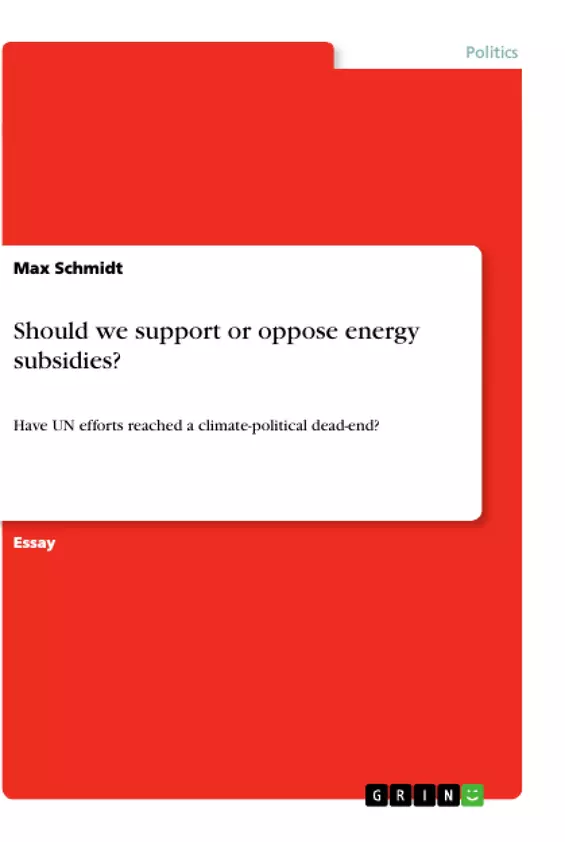This essay will discuss the following questions: Should we support or oppose energy subsidies? After three decades, UN efforts to address climate change have reached a dead-end.
In this essay, it will be argued that firstly, from a conceptual viewpoint, energy subsidies (ES) must not be considered a monolith. Secondly, from a more empirical viewpoint, it becomes clear that most ES benefit particular interests more than supposedly global economic and climatic interests, making the case for the opposition of these ES, whether they are fossil fuel subsidies (FFS) or such for renewable energy sources (RES).
Firstly, as expressions of political will ES play different roles across time and national contexts and are anything but uniform. A widely accepted definition that includes both FFS and RES stems from the International Energy Agency (IEA 1999). It understands ES broadly as any government action that is directed primarily at the energy sector and lowers the cost of energy production, raises the price received by energy producers or lowers the price paid by energy consumers.
These and further specifications are crucial since the notion of ES tends to hide more than the merely quantitative distinctness between FFS and RES. More precisely, it can be assumed that ES are – to different extents – interrelated with the energy
trilemma as a central challenge for energy governance. This is since, depending on the respective national context, they might affect its three competing aims of environmental sustainability, economic competitiveness and energy security differently and are equally subject to their preference order.
Inhaltsverzeichnis (Table of Contents)
- Should We Support or Oppose Energy Subsidies?
- Introduction
- The Concept of Energy Subsidies: Beyond a Monolith
- Energy Subsidies: Interests and Outcomes
- Conclusion
Zielsetzung und Themenschwerpunkte (Objectives and Key Themes)
This essay aims to analyze the complex issue of energy subsidies, particularly focusing on the debate surrounding their support or opposition. It delves into the conceptual framework of energy subsidies, highlighting their diverse roles and impacts across different contexts. The essay then explores the empirical evidence surrounding energy subsidies, examining their effects on various interests and outcomes, including environmental sustainability, economic competitiveness, and energy security.
- The multifaceted nature of energy subsidies and their differing roles across national contexts
- The interplay between energy subsidies and the energy trilemma, which encompasses environmental sustainability, economic competitiveness, and energy security
- The potential for energy subsidies to benefit particular interests at the expense of global economic and climatic interests
- The role of energy subsidies in promoting or hindering the transition towards a low-carbon energy future
- The need for a comprehensive evaluation of energy subsidies that considers both their potential benefits and drawbacks
Zusammenfassung der Kapitel (Chapter Summaries)
- Introduction: This section introduces the topic of energy subsidies and their diverse definitions and estimations, emphasizing the importance of a nuanced understanding of the subject.
- The Concept of Energy Subsidies: Beyond a Monolith: This chapter explores the conceptual framework of energy subsidies, highlighting their varied roles and impacts across different contexts. It emphasizes the need to move beyond simplistic support or opposition arguments, considering the interplay between energy subsidies and the energy trilemma, which includes environmental sustainability, economic competitiveness, and energy security.
- Energy Subsidies: Interests and Outcomes: This chapter examines the empirical evidence regarding energy subsidies, focusing on their effects on different interests and outcomes. It analyzes the impact of energy subsidies on environmental sustainability, economic competitiveness, and energy security, highlighting the potential for subsidies to benefit particular interests at the expense of global economic and climatic interests.
Schlüsselwörter (Keywords)
The primary focus of this essay is on energy subsidies, particularly fossil fuel subsidies and renewable energy source subsidies. The essay also explores the concept of the energy trilemma, which encompasses environmental sustainability, economic competitiveness, and energy security. It investigates the impact of energy subsidies on global economic and climatic interests, as well as their role in promoting or hindering the transition towards a low-carbon energy future. Other key themes include energy justice, energy access, and the "true costs" of fossil fuels.
Frequently Asked Questions
What are energy subsidies (ES)?
Energy subsidies are government actions that lower the cost of energy production, raise the price for producers, or lower the price for consumers. They include both fossil fuel and renewable energy supports.
What is the "energy trilemma"?
The energy trilemma describes the challenge of balancing three competing goals: environmental sustainability, economic competitiveness, and energy security.
Should we oppose fossil fuel subsidies (FFS)?
The essay argues that FFS often benefit particular interests more than global climatic goals, making a case for their opposition to facilitate the transition to a low-carbon future.
Do renewable energy subsidies (RES) have drawbacks?
While RES support sustainability, they can also be influenced by specific political interests and national contexts, requiring a nuanced evaluation of their long-term economic impact.
How do energy subsidies affect global climatic interests?
By artificially lowering the price of fossil fuels, subsidies can hinder climate change efforts. Conversely, well-designed subsidies for renewables can promote energy justice and lower carbon emissions.
- Quote paper
- Max Schmidt (Author), 2020, Should we support or oppose energy subsidies?, Munich, GRIN Verlag, https://www.grin.com/document/978892



